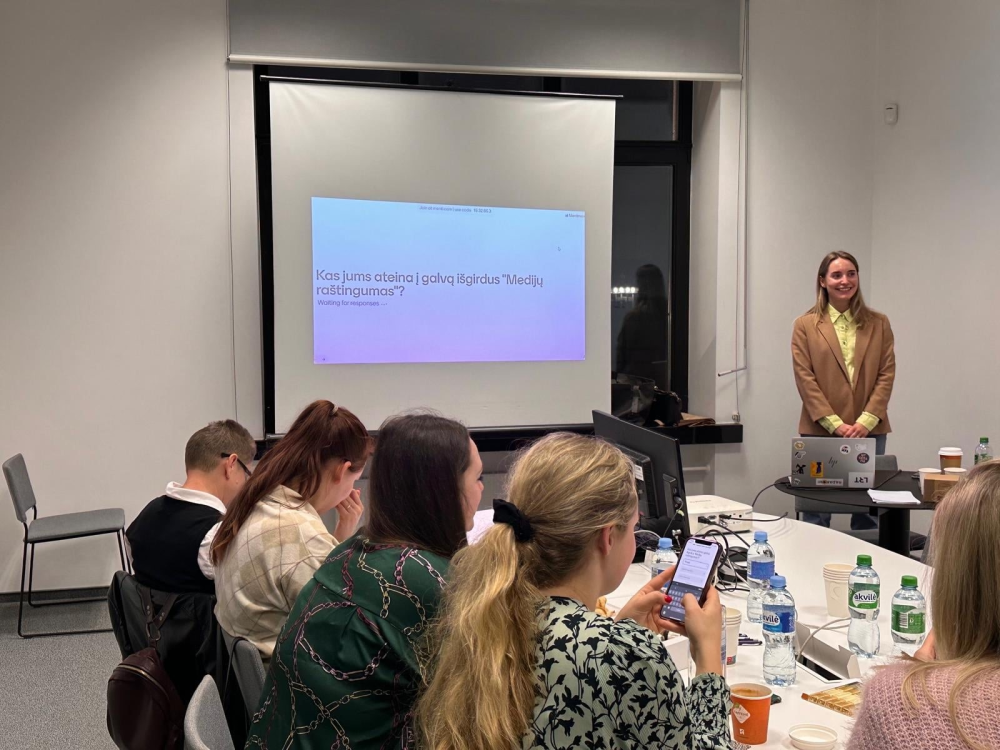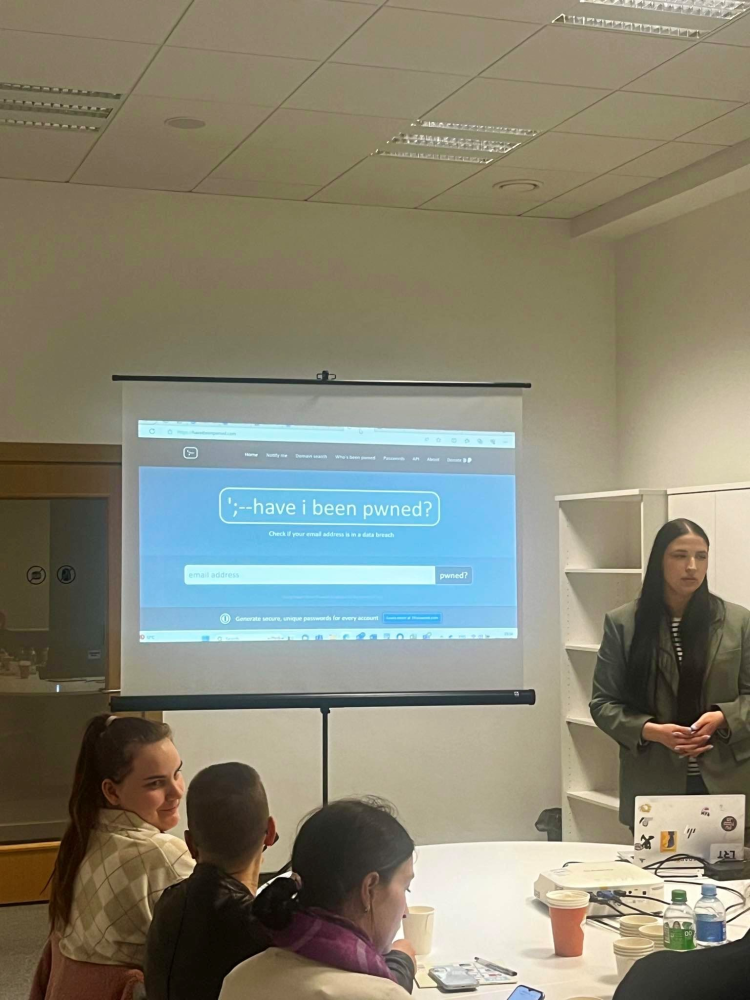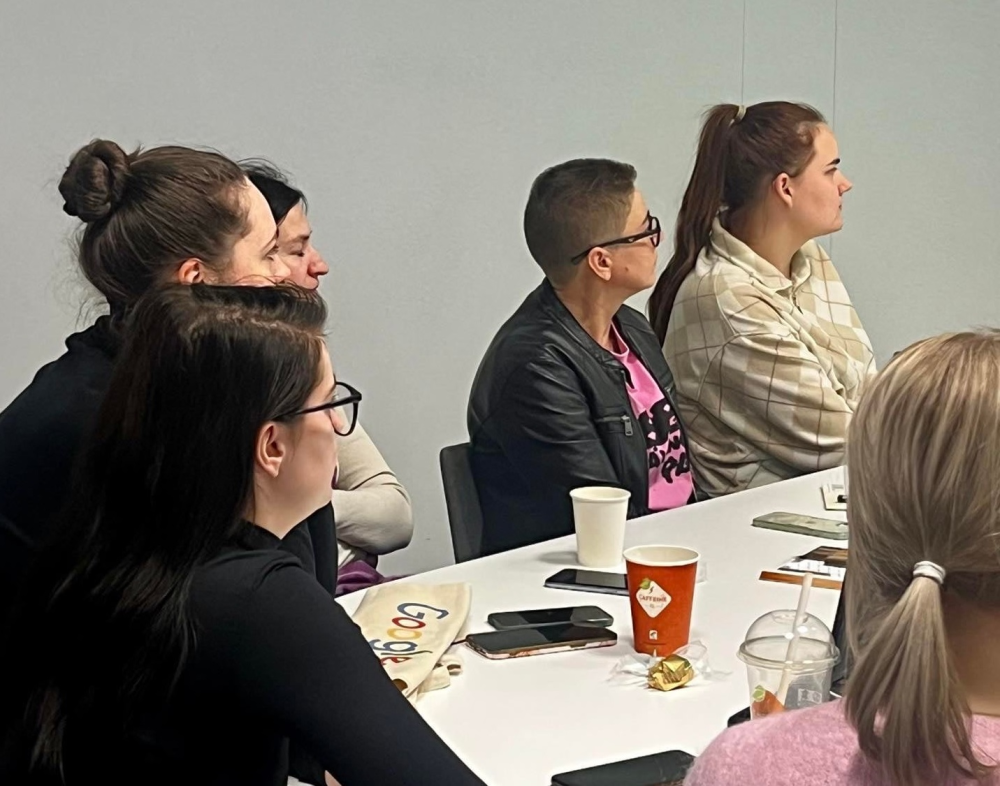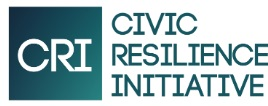The rapidly changing content and the ever-increasing flow of information challenge everyone, and the ability to distinguish reliable information from misinformation is essential for making informed decisions in both personal and professional life. In addition, media literacy fosters creativity and digital literacy, enabling people to not only consume but also create content that is ethical and responsible.
Media literacy training in Vilnius
As part of the Resilient Baltics project, kindergarten teachers in Vilnius were invited to media literacy training. The training focused on exploring the possibilities of media literacy and artificial intelligence (AI), exploring different forms of communication, and the application of modern technologies in the educational process. The teachers had the opportunity to acquire new skills that can help them to work with children in a more modern and creative way, and to apply the acquired knowledge in their educational process.
 Picture 1. Training in Vilnius. Source: Civic Resilience Initiative.
Picture 1. Training in Vilnius. Source: Civic Resilience Initiative.
During the project, participants tried out various practical tools that can help ensure security on social networks. Google Privacy Checkup and Have I Been Pwned were presented as important tools to help protect personal data and check whether personal accounts have been compromised. A strong focus was placed on online security issues, such as how to generate complex passwords and keep social networking accounts as secure as possible. We used various password generators and managers to create complex passwords. These tools helped us to create strong, hard-to-guess passwords made up of random letters, numbers, and special characters.
 Picture 2. Have I Been Pwned training. Source: Civic Resilience Initiative.
Picture 2. Have I Been Pwned training. Source: Civic Resilience Initiative.
One of the most important parts of the training was devoted to exploring the potential of artificial intelligence. Teachers learned how AI can be used to personalize the content of education according to the needs of each child: it helps to promote learning through interactive programs and to analyze children's learning progress. For example, ChatGPT was presented as a tool that can help to create creative tasks and plan the educational process.
The training explored different types and forms of communication. They analyzed the messages conveyed by advertising, learned how to identify hidden advertising, and how different forms of communication can influence the audience. The aim of these sessions was to encourage the participants to analyze media content more carefully, to develop their critical thinking skills, and to identify subtle methods of manipulation that can influence children.
In addition, the Google Advanced Search engine was analyzed in order to help educators find accurate and reliable information on the Internet more effectively. Participants learned how to use advanced search functions that would allow them to filter results according to different criteria, thus improving the quality and efficiency of information search. In addition, the training introduced the principle of Google Trends, which allows tracking and analyzing popular search queries and their trends. This helped the participants to better understand what topics and issues are relevant to society and how this information can be used in the educational process.
The importance of copyright was also discussed during the project. Participants learned about the rules of intellectual property protection, ethical principles, and the basics of legal compliance in the digital space. This is particularly important when creating and sharing educational content to ensure legal and ethical practices.
Creating a resilient community of information consumers
By promoting media literacy education in schools, universities, and adult education programs, we can create a more informed society that is able to analyze information and make informed decisions. It helps to build a responsible and resilient community of information consumers, providing the tools and knowledge to use the internet effectively, identify reliable sources, and analyze the information they receive. The ability to use search engines, check the credibility of sources, and to recognize the signs of misinformation helps to avoid being influenced by misleading information. In addition, learning about cyber threats, such as social engineering attacks, can help users protect themselves against a range of manipulations and dangers.
 Picture 3. Media Literacy training participants. Source: Civic Resilience Initiative.
Picture 3. Media Literacy training participants. Source: Civic Resilience Initiative.
This training program not only provided new knowledge and practical skills but also helped to build a stronger technological foundation, which is essential for educating today's generation. By applying the knowledge acquired on computer literacy, artificial intelligence, and online safety, educators will be able not only to educate children more innovatively but also to keep them safe in the digital space. This in turn will help build a responsible and critically thinking society, able to recognize and resist misinformation and manipulation. This project is a prime example of the importance of media literacy across all age groups in building an informed and resilient society.
Background illustration: Civic Resilience Initiative.
